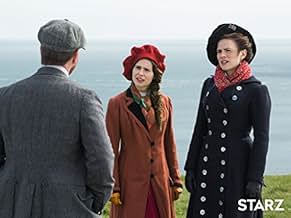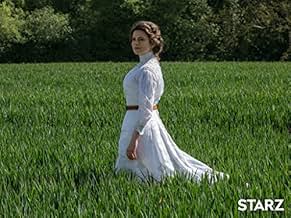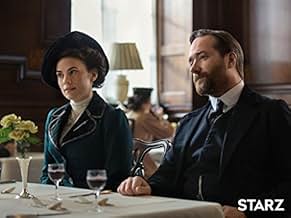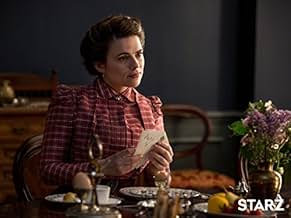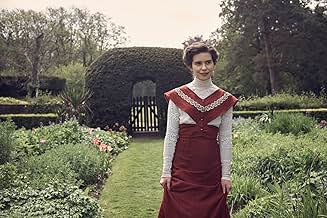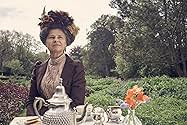As divisões sociais e de classe na Inglaterra do início do século XX através da interseção de três famílias, os ricos Wilcoxes, os gentis e idealistas Schlegels e os Basts de classe média ba... Ler tudoAs divisões sociais e de classe na Inglaterra do início do século XX através da interseção de três famílias, os ricos Wilcoxes, os gentis e idealistas Schlegels e os Basts de classe média baixa.As divisões sociais e de classe na Inglaterra do início do século XX através da interseção de três famílias, os ricos Wilcoxes, os gentis e idealistas Schlegels e os Basts de classe média baixa.
- Indicado para 1 prêmio BAFTA
- 1 vitória e 12 indicações no total
Explorar episódios
Avaliações em destaque
Matthew McFayden and Hayley Atwell just lit up the screen... I thought perhaps the glory days of BBC Sunday night costume dramas had past, but their performances here were wonderful, the control and command of the dialogue was exquisite. A delight.
I have given 9 out of 10, so I will note that a few minor quibbles: - Some of the plot elements were a bit clunky - It wasn't always clear how much time had elapsed or how much the characters had aged - It felt a little stretched out to episodes
I have given 9 out of 10, so I will note that a few minor quibbles: - Some of the plot elements were a bit clunky - It wasn't always clear how much time had elapsed or how much the characters had aged - It felt a little stretched out to episodes
This series is quite beautiful in terms of scenery, score and cinematography, and though the dialogue is a bit meandering and often feels to be of little consequence I did enjoy the dynamic between the three siblings and their aunt.
The main issue I have with the series is the total lack of chemistry between any of the romantic pairs. Absolutely none of their relationships felt believable.
The only characters I felt had any potentially sexual chemistry was Mrs Wilcox and Margaret, so to see Margaret later paired with the bland, unlovable and callous Mr Wilcox was baffling. The feelings which they supposedly have for each other do not read as authentic, and so Margaret becomes a less likeable character as a consequence.
Furthermore, several pieces of the story feels disjointed - I'm thinking particularly of the space between episodes 1 and 2 and the of end; both places where large amounts of time is skipped over. This kind of skipping is of course typical of epilogues, but in this case it felt weirdly jarring. They were obviously trying to wrap the series up in a neat little bow, but if felt anything but neat.
Without spoiling the end, the events which lead to the resolution seemed extremely cheap and almost offensive in how certain characters were disposed of.
If nothing else the series did make me curious to read the book Howard's End and see whether the series fails due to going too far away from the source material, or not having the proper means to give the source material life.
The main issue I have with the series is the total lack of chemistry between any of the romantic pairs. Absolutely none of their relationships felt believable.
The only characters I felt had any potentially sexual chemistry was Mrs Wilcox and Margaret, so to see Margaret later paired with the bland, unlovable and callous Mr Wilcox was baffling. The feelings which they supposedly have for each other do not read as authentic, and so Margaret becomes a less likeable character as a consequence.
Furthermore, several pieces of the story feels disjointed - I'm thinking particularly of the space between episodes 1 and 2 and the of end; both places where large amounts of time is skipped over. This kind of skipping is of course typical of epilogues, but in this case it felt weirdly jarring. They were obviously trying to wrap the series up in a neat little bow, but if felt anything but neat.
Without spoiling the end, the events which lead to the resolution seemed extremely cheap and almost offensive in how certain characters were disposed of.
If nothing else the series did make me curious to read the book Howard's End and see whether the series fails due to going too far away from the source material, or not having the proper means to give the source material life.
Hayley Atwell enchants in this brilliant and faithful BBC adaptation of EM Forster's great novel. All of the actors are very convincing in their portrayal of multi-faceted characters. I didn't want the show to end. It's a thorough examination of class and social mores, and the message is not lost in time and very much relevant today in the debate between liberals and conservatives. The human spirit, compassion and love prevail. A must-watch for period drama fans like me.
I fell in love with Emma Thompson's portrayal of Margaret Schlegel in the 1990s film version. I loved the film as a whole. But this version is just as worthy, and being a four-hour series, can embrace a larger picture and more importantly, a larger canvas of characters.
Leonard Bast is central to the plot, but in the film, he was a cipher, a vessel and a canvass for the sisters to paint. I read the book and while women of their class might have seen him that way, I didn't, and I liked that he was given more of a presence and personality. In the film there was no real connection between him and Helen, while in this version, there is one, however tenuous and fleeting. I felt it gave him the respect he deserved, and in doing so strengthened the underlying message.
I also preferred this version of Henry. Hopkins is brilliant, but to me, Margaret's attraction to him in the film made little sense. No, not even in Edwardian times. She was fierce and self-possessed, he was dull and rigid, and she didn't need his money or stamp of approval. I needed to buy the connection and this version made it breath so much more freely. Not even Emma Thompson can convince me of something unpalatable.
Some stories just need more time to unfold. Four hours worked well enough, whereas two and half, or even three, didn't. I still love the film version and Helena Bonham Carter is just irreplaceable, but Philippa Coulthard makes a great Helen too People who want to have an issue with Jackie Bast or a few servants or doctors being minorities can fuss away about it all they want. It might be historically unlikely, but it is by no means historically "incorrect" and it shouldn't jar anyone who is paying attention to what matters in the story. If anything it adds to it.
I loved this version. Kudos to all involved, especially Atwell, Coulthard, McFadyen, and the young actor playing Tibby. Oh, and Ullman. It can be scary to take on a classic that has supposedly been "claimed" by film deities. They did it proud.
Leonard Bast is central to the plot, but in the film, he was a cipher, a vessel and a canvass for the sisters to paint. I read the book and while women of their class might have seen him that way, I didn't, and I liked that he was given more of a presence and personality. In the film there was no real connection between him and Helen, while in this version, there is one, however tenuous and fleeting. I felt it gave him the respect he deserved, and in doing so strengthened the underlying message.
I also preferred this version of Henry. Hopkins is brilliant, but to me, Margaret's attraction to him in the film made little sense. No, not even in Edwardian times. She was fierce and self-possessed, he was dull and rigid, and she didn't need his money or stamp of approval. I needed to buy the connection and this version made it breath so much more freely. Not even Emma Thompson can convince me of something unpalatable.
Some stories just need more time to unfold. Four hours worked well enough, whereas two and half, or even three, didn't. I still love the film version and Helena Bonham Carter is just irreplaceable, but Philippa Coulthard makes a great Helen too People who want to have an issue with Jackie Bast or a few servants or doctors being minorities can fuss away about it all they want. It might be historically unlikely, but it is by no means historically "incorrect" and it shouldn't jar anyone who is paying attention to what matters in the story. If anything it adds to it.
I loved this version. Kudos to all involved, especially Atwell, Coulthard, McFadyen, and the young actor playing Tibby. Oh, and Ullman. It can be scary to take on a classic that has supposedly been "claimed" by film deities. They did it proud.
Although I felt the 1992 film was so good that it couldn't be improved on, I found this TV version surprisingly good and the four hours hardly seemed enough to contain all the strands of the story. The acting was perfect, neither overdone nor underdone. As it happens, I live in Stevenage and know the location of Howards End well. The location used was somewhere else of course but I thought it was quite like the original could have been in 1890 when the author would have known it, and perfect for the purposes of the drama. I sympathise with the points people make about black servants and so on, but whether or not these exist in the book, they are certainly quite plausible for the time. The winner for me was E.M. Forster again, as it was in 1992, but I will miss the programme and wish there could be a sequel - perhaps another Passage to India. It's indeed a pity that Forster stopped writing novels so soon, as with his understanding of social mores and change, he would have been a good person to write about the 1930s or 1940s. The last hour was for me a blissful one.
Você sabia?
- CuriosidadesHayley Atwell and Matthew McFadyen worked to together in "The Pillars of the Earth" in 2010.
- ConexõesReferenced in Honest Trailers: The Oscars (2017) (2017)
Principais escolhas
Faça login para avaliar e ver a lista de recomendações personalizadas
Detalhes
- Data de lançamento
- Países de origem
- Central de atendimento oficial
- Idiomas
- Também conhecido como
- 霍華德莊園
- Locações de filme
- Myddleton Square, Clerkenwell, Londres, Inglaterra, Reino Unido(Schlegels' house)
- Empresas de produção
- Consulte mais créditos da empresa na IMDbPro
Contribua para esta página
Sugerir uma alteração ou adicionar conteúdo ausente









